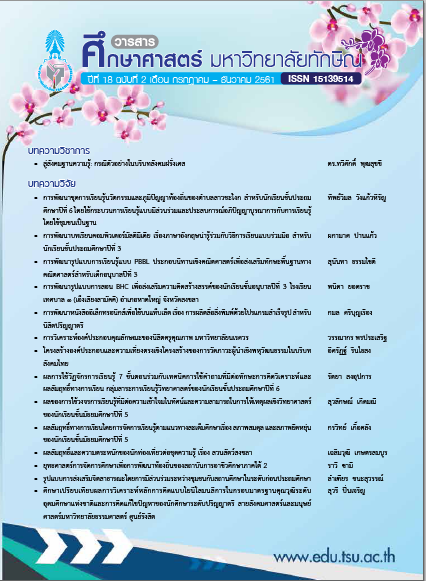การพัฒนารูปแบบการเรียนรู้แบบ PBBL ประกอบนิทานเชิงคณิตศาสตร์ เพื่อส่งเสริมทักษะพื้นฐานทางคณิตศาสตร์สำหรับเด็กอนุบาลปีที่ 3
Main Article Content
บทคัดย่อ
การวิจัยครั้งนี้ มีวัตถุประสงค์ 1) เพื่อสร้างและพัฒนารูปแบบการเรียนรู้แบบ PBBL ประกอบนิทานเชิงคณิตศาสตร์เพื่อส่งเสริมทักษะพื้นฐานทางคณิตศาสตร์สำหรับเด็กอนุบาลปีที่ 3 2) เพื่อศึกษาประสิทธิภาพของรูปแบบการเรียนรู้แบบ PBBL ประกอบนิทานเชิงคณิตศาสตร์เพื่อส่งเสริมทักษะพื้นฐานทางคณิตศาสตร์สำหรับเด็กอนุบาลปีที่ 3 3) เพื่อเปรียบเทียบทักษะพื้นฐานทางคณิตศาสตร์สำหรับเด็กอนุบาลก่อนและหลังการใช้รูปแบบการเรียนรู้แบบ PBBL ประกอบนิทานเชิงคณิตศาสตร์เพื่อส่งเสริมทักษะพื้นฐานทางคณิตศาสตร์สำหรับเด็กอนุบาลปีที่ 3 4) เพี่อศึกษาเจตคติต่อการเรียนคณิตศาสตร์ด้วยรูปแบบการเรียนรู้แบบ PBBL ประกอบนิทานเชิงคณิตศาสตร์เพื่อส่งเสริมทักษะพื้นฐานทางคณิตศาสตร์สำหรับเด็กอนุบาลปีที่ 3 ประชากรและกลุ่มตัวอย่าง ได้แก่ เด็กอนุบาลปีที่ 3/2 จำนวน 30 คน โรงเรียนเทศบาล ๑ (เอ็งเสียงสามัคคี) อำเภอหาดใหญ่ จังหวัดสงขลา ภาคเรียนที่ 1 ปีการศึกษา 2557 ได้มาโดยการสุ่มแบบเจาะจง (Purposive Selection) เครื่องมือที่ใช้วิจัยครั้งนี้ คือ แผนการจัดกิจกรรม แบบวัดทักษะพื้นฐานทางคณิตศาสตร์ และแบบวัดเจตคติขั้นตอนการดำเนินการวิจัย แบ่งเป็น 4 ระยะ คือ ระยะที่ 1 การสร้างรูปแบบการเรียนรู้แบบ PBBLระยะที่ 2 การสร้างเครื่องมือประกอบการใช้รูปแบบการเรียนรู้แบบ PBBL ระยะที่ 3 การทดลองใช้รูปแบบการเรียนรู้แบบ PBBLและระยะที่ 4 การทดสอบประสิทธิผลรูปแบบการเรียนรู้แบบ PBBL
ผลการวิจัยพบว่า
- การพัฒนารูปแบบการเรียนรู้แบบ PBBL ประกอบนิทานเชิงคณิตศาสตร์เพื่อส่งเสริมทักษะพื้นฐานทางคณิตศาสตร์สำหรับเด็กอนุบาลปีที่ 3 โดยใช้นิทานร้อยแก้วหรือร้อยกรองง่าย ๆ ที่มีเนื้อหาสอดแทรกคณิตศาสตร์ไม่ซับซ้อน เข้าใจง่ายเกี่ยวข้องกับทักษะพื้นฐานทางคณิตศาสตร์ใน 10 ทักษะ
- ผลการหาประสิทธิภาพ โดยทดลองใช้กับเด็กชั้นอนุบาลปีที่ 3 โรงเรียนเทศบาล ๑ (เอ็งเสียงสามัคคี) จำนวน 30 คน พบว่า ค่าประสิทธิภาพที่ตั้งไว้ (E1/E2) เท่ากับ 81.56/89.50 ซึ่งสูงกว่าเกณฑ์ที่ตั้งไว้ 80/80
- ผลการเปรียบเทียบทักษะพื้นฐานทางคณิตศาสตร์สำหรับเด็กอนุบาลก่อนและหลังการใช้รูปแบบการเรียนรู้แบบ PBBL ประกอบนิทานเชิงคณิตศาสตร์เพื่อส่งเสริมทักษะพื้นฐานทางคณิตศาสตร์สำหรับเด็กอนุบาลปีที่3 พบว่า ก่อนเรียนมีคะแนนเฉลี่ย เท่ากับ 12.43 และหลังเรียนมีค่าเฉลี่ย เท่ากับ 17.90 ซึ่งคะแนนหลังเรียนสูงกว่าก่อนเรียน เมื่อพิจารณาเปรียบเทียบการทดสอบที (t - test) พบว่า ค่าทีที่ได้จากการคำนวณมีค่า เท่ากับ 26.34 สูงกว่าค่าทีจากตาราง แสดงว่าก่อนและหลังการใช้รูปแบบการเรียนรู้แบบ PBBL ประกอบนิทานเชิงคณิตศาสตร์เพื่อส่งเสริมทักษะพื้นฐานทางคณิตศาสตร์สำหรับเด็กอนุบาลปีที่ 3 แตกต่างกันอย่างมีนัยสำคัญทางสถิติที่ระดับ .05
4. ผลการศึกษาเจตคติต่อทักษะพื้นฐานทางคณิตศาสตร์สำหรับเด็กอนุบาลก่อนและหลังการใช้รูปแบบการเรียนรู้แบบ PBBL ประกอบนิทานเชิงคณิตศาสตร์เพื่อส่งเสริมทักษะพื้นฐานทางคณิตศาสตร์สำหรับเด็กอนุบาลปีที่ 3 พบว่า ภาพรวมอยู่ในระดับมากที่สุด มีค่าเฉลี่ยเท่ากับ 4.59 และเมื่อพิจารณารายข้อ พบว่า ข้อที่มีค่าเฉลี่ยมากที่สุด คือ ขณะที่ครูเล่านิทาน ฉันตั้งใจฟังและติดตามโดยไม่รู้สึกเบื่อหน่าย และการสอนของครูทำให้ฉันตื่นเต้นกับปัญหาที่ใหม่ ๆ ที่ท้าทาย มีค่าเฉลี่ยเท่ากับ 4.77 ข้อที่มีค่าเฉลี่ยน้อยที่สุด คือ การสอนของครูทำให้ฉันได้มีโอกาสได้แสดงความคิดเห็น มีค่าเฉลี่ยเท่ากับ 4.40
Article Details
ในกรณีที่กองบรรณาธิการ หรือผู้เชี่ยวชาญ ซึ่งได้รับเชิญให้เป็นผู้ตรวจบทความวิจัย หรือ บทความทางวิชาการมีความเห็นว่าควรแก้ไขความบกพร่อง ทางกองบรรณาธิการจะส่งต้นฉบับให้ ผู้เขียนพิจารณาจัดการแก้ไขให้เหมาะสมก่อนที่จะลงพิมพ์ ทั้งนี้ กองบรรณาธิการจะยึดถือความคิด เห็นของผู้เชี่ยวชาญเป็นเกณฑ์
เอกสารอ้างอิง
ขวัญนุช บุญยู่ฮง. (2546). การส่งเสริมทักษะพื้นฐานทางคณิตศาสตร์ของเด็กปฐมวัยโดยการเล่า “นิทานคณิต”. ปริญญาการศึกษามหาบัณฑิต สาขาการศึกษาปฐมวัย. กรุงเทพมหานคร:มหาวิทยาลัยศรีนครินทรวิโรฒ.
คมขวัญ อ่อนบึงพร้าว. (2550). การพัฒนาทักษะพื้นฐานทางคณิตศาสตร์สำหรับเด็กปฐมวัยโดยใช้รูปแบบกิจกรรมศิลปะสร้างสรรค์เพื่อการเรียนรู้. ปริญญานิพนธ์การศึกษามหาบัณฑิต สาขาวิชาการศึกษาปฐมวัย. กรุงเทพมหานคร : มหาวิทยาลัยศรีนครินทรวิโรฒ.
ชูศรี วงศ์รัตนะ. (2558). เทคนิคการใช้สถิติเพื่อการวิจัย. กรุงเทพมหานคร : เทพเนรมิตการพิมพ์.
บุญชม ศรีสะอาด. (2553). การวิจัยเบื้องต้น. พิมพ์ครั้งที่ 8. กรงเทพมหานคร : สุวีริยาสาส์น
ปานิตา กุดกรุง. (2553). ทักษะพื้นฐานทางคณิตศาสตร์ของเด็กปฐมวัยที่ได้รับการจัดกิจกรรมศิลปะสร้างสรรค์จากวัสดุธรรมชาติ. (ปริญญานิพนธ์การศึกษามหาบัณฑิต สาขาวิชาการศึกษาปฐมวัย. กรุงเทพมหานคร : มหาวิทยาลัยศรีนครินทรวิโรฒประสานมิตร).
พวงรัตน์ พุ่มคชา. (2545). การพัฒนาความสามารถทางคณิตศาสตร์ของเด็กอนุบาลที่เรียนโดยใช้เรื่องเชิงคณิตศาสตร์.กรุงเทพมหานคร : จุฬาลงกรณ์มหาวิทยาลัย.
เพิ่มวุธ บุปผามาตะนัง. (2539).การเปรียบเทียบผลสัมฤทธิ์ทางการเรียนวิชาคณิตศาสตร์และเจตคติต่อวิชาคณิตศาสตร์เรื่องการหารทศนิยมของนักเรียนชั้นประถมศึกษาปีที่ 6 ที่ได้รับการสอนแบบร่วมมือกันเรียนรู้ (TAI)กับการสอนปกติ. (วิทยานิพนธ์การศึกษามหาบัณฑิต. จังหวัดมหาสารคาม : มหาวิทยาลัยมหาสารคาม).
มาลิณี พลสูงเนิน. (2548). การพัฒนาแผนการจัดประสบการณ์เพื่อเตรียมความพร้อมด้านการอ่านโดยการเล่านิทานประกอบหุ่นมือ ชั้นอนุบาลปีที่ 2. (การศึกษาค้นคว้าอิสระ ปริญญาการศึกษามหาบัณฑิตสาขาวิชาการศึกษาปฐมวัย. จังหวัดมหาสารคาม : มหาวิทยาลัยมหาสารคาม).
วรินธร สิริเตชะ. (2550). การสงเสริมทักษะพื้นฐานทางคริตศาสตรของเด็กปฐมวัยโดยการจัดประสบการณกิจกรรมดนตรีตามแนวออรฟ-ชูคเวิรค. (ปริญญาการศึกษามหาบัณฑิต.กรุงเทพมหานคร : มหาวิทยาลัยศรีนครินทรวิโรฒ).
สถาบันส่งเสริมการสอนวิทยาศาสตร์และเทคโนโลยี กระทรวงศึกษาธิการ. (2551). คู่มือกรอบมาตรฐานการเรียนรู้คณิตศาสตร์ปฐมวัย ตามหลักสูตรการศึกษาปฐมวัย พุทธศักราช 2546. กรุงเทพมหานคร :บริษัท แอดวานซ์พริ้นติ้ง เซอร์วิส.
สำนักงานเลขาธิการสภาการศึกษา. (2553). แผนการศึกษาแห่งชาติ ฉบับปรับปรุง (พ.ศ. 2552 - 2559). กรุงเทพมหานคร:บริษัท พริกหวานกราฟฟิค จำกัด.
Costello, Patrick J.M. (2000). Thinking Skills and Early Childhood Education. London :David Fulton.


